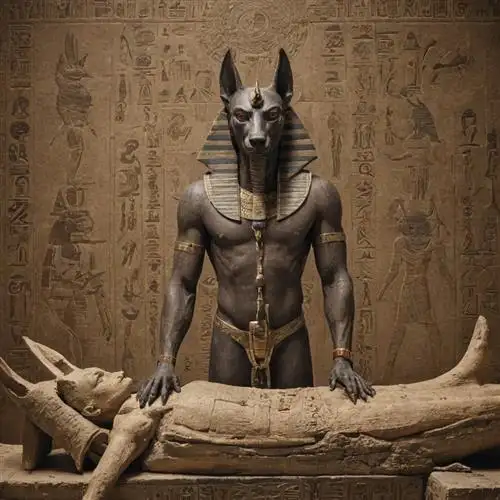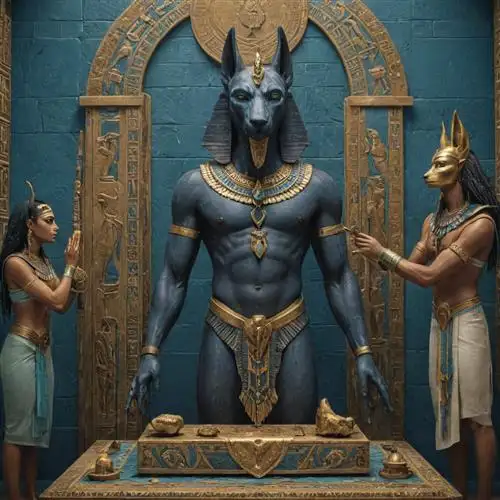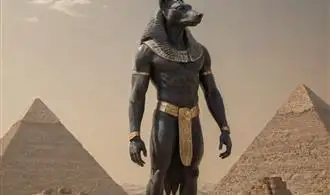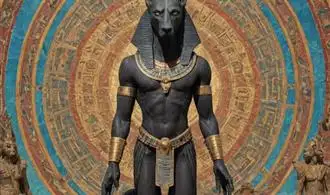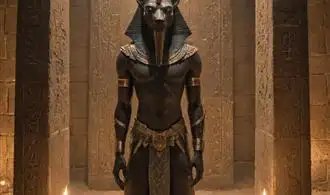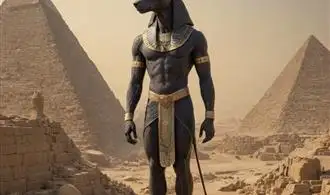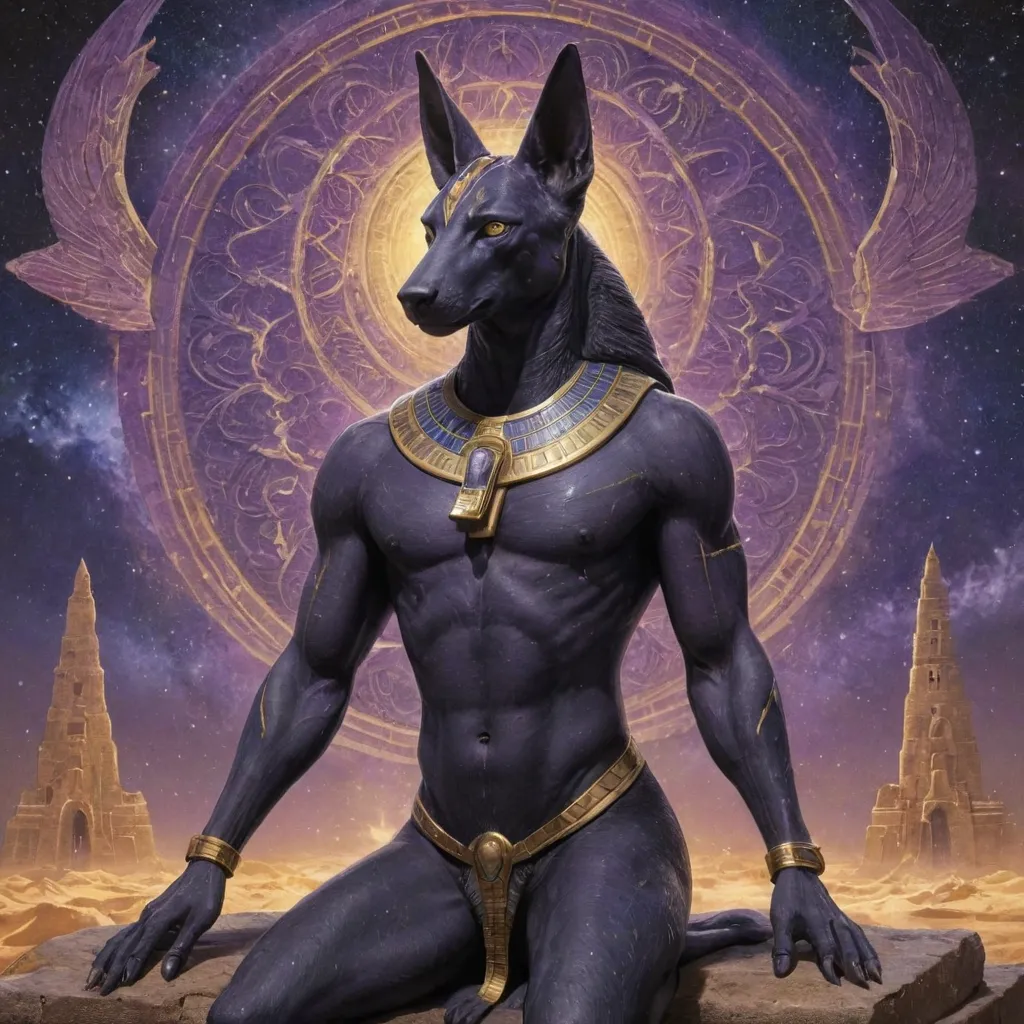
The Significance of Anubis in Ancient Egyptian Afterlife
Anubis, the jackal-headed god, held a profound significance in the ancient Egyptian belief system, particularly concerning the afterlife. As the god of embalming and the protector of the dead, Anubis played a crucial role in the intricate rituals and practices that guided the deceased on their journey to the next world.
One of Anubis's primary responsibilities was overseeing the mummification process, a complex and meticulous procedure that prepared the deceased for their eternal existence. The jackal-headed deity was believed to be present during the embalming, ensuring the proper preservation of the body and the preservation of the ka, the vital life force that would accompany the soul in the afterlife.
Anubis also played a significant role in the judgment of the dead, as he was responsible for weighing the heart of the deceased against the feather of truth, the symbol of Ma'at, the goddess of justice and order. This ritual, known as the Weighing of the Heart, determined the fate of the soul. If the heart was found to be pure and truthful, the individual was granted passage to the afterlife. If, however, the heart was deemed impure or heavy with sin, the soul would be consumed by the devouring monster Ammit, and the individual would cease to exist.
The association of Anubis with the afterlife extended beyond the Weighing of the Heart ceremony. The jackal-headed god was believed to guide the deceased through the underworld, protecting them from the dangers and challenges they would encounter on their journey. Anubis was also responsible for opening the mouth of the deceased, a ritual that was thought to restore the ability to speak and breathe in the afterlife.
Anubis Guide to the Afterlife
As the guide to the afterlife, Anubis plays a crucial role in the Egyptian belief system. This jackal-headed deity is responsible for overseeing the transition of the deceased from the mortal world to the afterlife. Anubis is associated with mummification, the embalming process, and the weighing of the heart ceremony, where the soul's worthiness is determined before it can enter the afterlife.
One of the primary functions of Anubis is to lead the deceased through the underworld, ensuring their safe passage to the afterlife. This journey is fraught with challenges, and Anubis provides guidance and protection throughout the process. The deceased must navigate a series of obstacles, including dangerous creatures and treacherous landscapes, before reaching the final judgment.
The weighing of the heart ceremony is a pivotal moment in the afterlife journey. During this ritual, the deceased's heart is weighed against the feather of truth, representing the individual's moral character and deeds. If the heart is found to be pure and free of sin, the soul is permitted to move on to the next stage of the afterlife. However, if the heart is found to be heavier than the feather, the soul is deemed unworthy and is ultimately destroyed.
For those who successfully navigate the underworld and have their hearts deemed pure, the afterlife offers a realm of eternal peace and prosperity. In this realm, the deceased are reunited with their loved ones and are able to enjoy a peaceful existence, free from the trials and tribulations of the mortal world. Anubis Predicts the Future of the Afterlife suggests that this eternal realm may evolve and change over time, but the core principles of the afterlife remain constant.
Mummification and the Role of Anubis
In ancient Egyptian mythology, the god Anubis played a crucial role in the process of mummification, the elaborate ritual of preserving the dead body. As the jackal-headed deity associated with the afterlife, Anubis was responsible for guiding the deceased through the intricate steps of this sacred practice, ensuring their successful transition to the next life.
The mummification process was a meticulous and painstaking procedure that typically took 70 days to complete. Anubis, the "Lord of the Sacred Land," oversaw every stage, from the removal of the internal organs to the final wrapping of the body in linen bandages. His presence was essential, as he was believed to have the power to protect the deceased and help them navigate the challenges of the afterlife.
One of the most significant roles of Anubis was the weighing of the heart ceremony, also known as the "Judgment of the Dead." In this ritual, the heart of the deceased was weighed against the feather of truth, representing the moral and ethical conduct of the individual. Anubis, as the guardian of this process, would carefully observe the proceedings, ensuring the fairness and accuracy of the judgment.
If the heart was found to be pure and the individual's deeds worthy, Anubis would guide the soul to the afterlife, where it would be reunited with the gods and enjoy eternal bliss. However, if the heart was found to be heavier than the feather, the soul would be condemned, and Anubis would hand it over to the devouring monster, Ammut, signifying the individual's moral failings and the consequences they would face in the afterlife.
Anubis and the Weighing of the Heart Ceremony
The Weighing of the Heart Ceremony, associated with the Egyptian god Anubis, holds immense significance in understanding the afterlife and its profound impact on one's life. This sacred ritual was a crucial component of the ancient Egyptian funerary practices, serving as a gateway to the afterlife and a means of determining the worthiness of the deceased.
At the center of this ceremony stood Anubis, the jackal-headed god who presided over the embalming process and the journey of the soul into the afterlife. Anubis was responsible for guiding the deceased through the intricate process of the Weighing of the Heart, ensuring the soul's successful transition into the next realm.
The ceremony itself was a meticulous and symbolic affair. The deceased's heart, considered the repository of their soul and moral character, was weighed against the feather of Ma'at, the goddess of truth, justice, and cosmic order. If the heart balanced perfectly with the feather, it signified the individual's purity and worthiness, granting them access to the afterlife. However, if the heart was found to be heavier, indicating the presence of sins or moral transgressions, the soul would be devoured by the devouring monster Ammit, effectively condemning the individual to eternal oblivion.
This profound ritual held immense power in the minds of the ancient Egyptians, as it not only determined the fate of the individual in the afterlife but also served as a constant reminder of the importance of living a virtuous and balanced life. The Weighing of the Heart Ceremony encouraged individuals to strive for moral and ethical excellence, knowing that their actions in this life would be scrutinized and judged in the next.
Transformative Insights from Anubis and the Afterlife
The ancient Egyptian deity Anubis, the god of the afterlife, offers profound insights that can transform our perspectives and reshape our lives. As the guardian of the dead, Anubis holds the key to understanding the mysteries of the afterlife, which in turn can inform and enrich our journey through the present.
One of the most powerful lessons from Anubis is the importance of honesty, integrity, and the weighing of one's actions. In the Egyptian afterlife, the heart of the deceased was placed on a scale and weighed against the feather of Ma'at, the goddess of truth and justice. This ritual, known as the "Weighing of the Heart," symbolized the judgment of the individual's moral worth, with only those whose hearts were found to be pure enough granted passage to the afterlife. This emphasis on personal accountability and the consequences of one's choices serves as a poignant reminder to live with mindfulness and authenticity.
Beyond the realm of the afterlife, Anubis also offers insights into the nature of transformation and rebirth. As the god who oversaw the embalming and mummification process, Anubis was intimately connected with the cycle of death and renewal. This perspective encourages us to embrace the natural cycles of growth and change, and to view endings not as finalities, but as opportunities for transformation and new beginnings.
Furthermore, Anubis's role as the guide of souls through the underworld underscores the importance of navigating the unknown with courage and resilience. Just as the deceased relied on Anubis to guide them safely through the challenges of the afterlife, we can draw strength and guidance from this deity when faced with the uncertainties and difficulties of our own lives. By embracing the lessons of Anubis, we can cultivate a deeper sense of trust in the process of life, and find the fortitude to confront the unknown with grace and determination.



